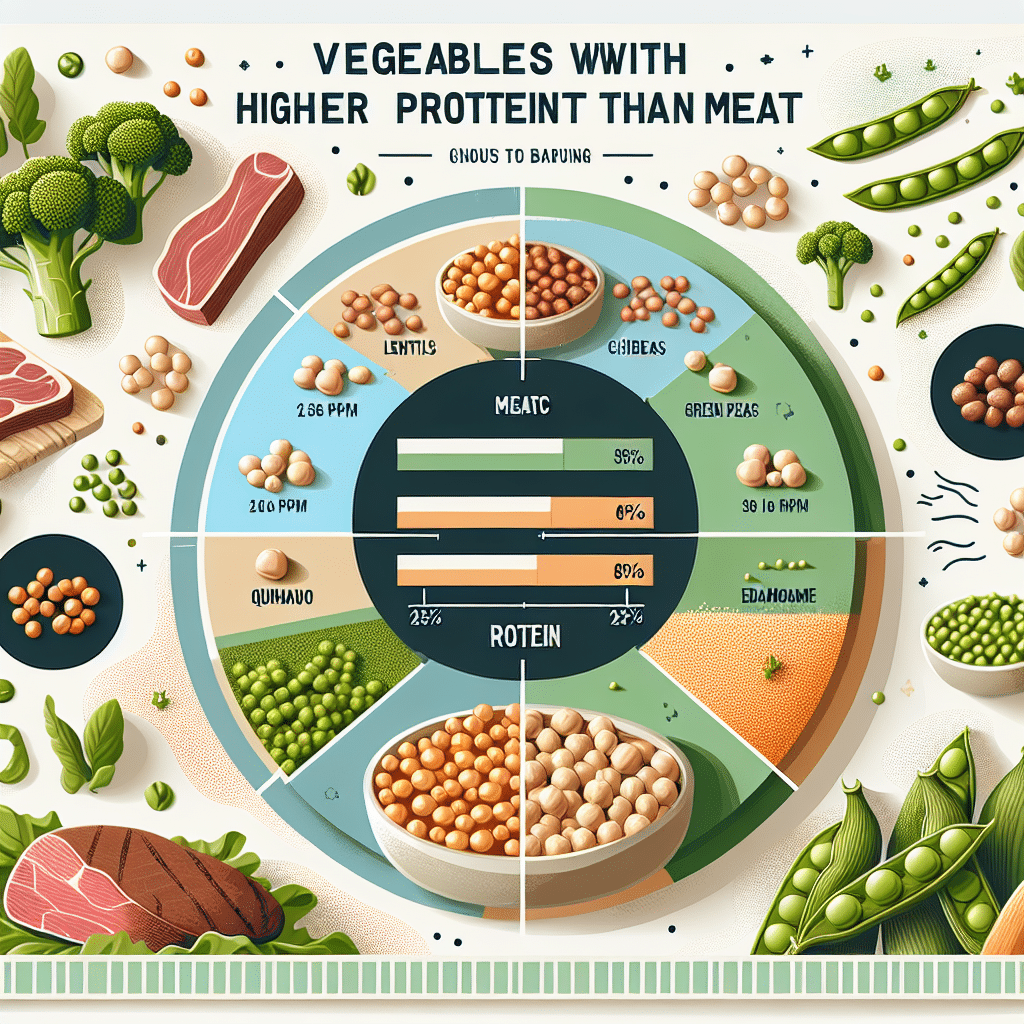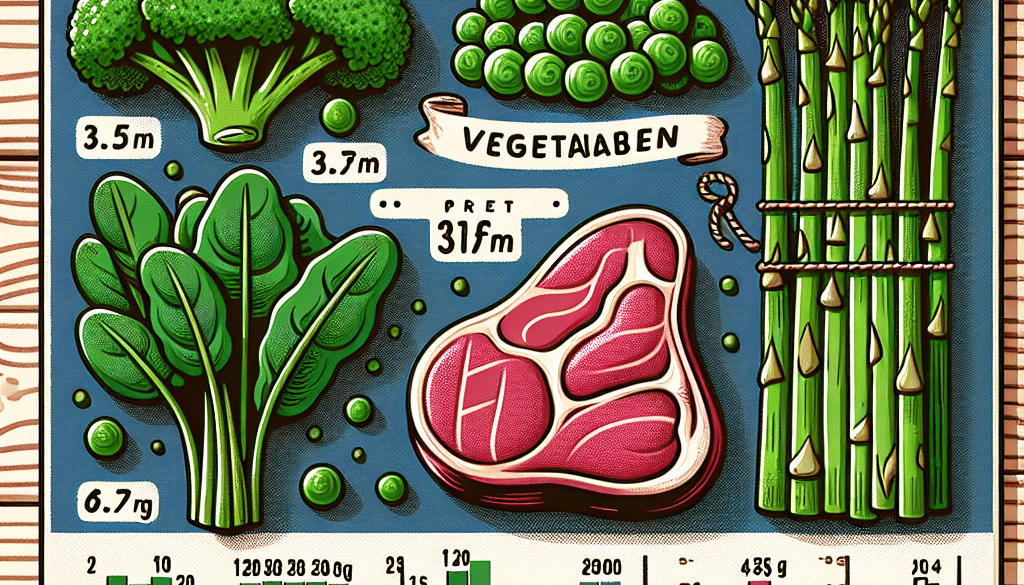What Vegetables Have More Protein Than Meat?
-
Table of Contents
- High-Protein Vegetables That Surpass Meat Options
- Understanding Protein in Vegetables vs. Meat
- Vegetables with More Protein Than Meat
- Case Studies and Statistics
- How to Incorporate High-Protein Vegetables into Your Diet
- Conclusion: Embracing Plant-Based Proteins
- Discover ETprotein’s High-Quality Protein Products
High-Protein Vegetables That Surpass Meat Options

When it comes to protein, meat is often the first food that comes to mind. However, what many don’t realize is that certain vegetables can pack a protein punch that rivals, and sometimes surpasses, that of meat. This revelation is particularly significant for vegetarians, vegans, and those looking to reduce their meat consumption without compromising on their protein intake. In this article, we’ll explore the vegetables that are high in protein and how they compare to meat options.
Understanding Protein in Vegetables vs. Meat
Protein is an essential macronutrient necessary for building muscle, repairing tissue, and producing enzymes and hormones. While meat is a complete protein source containing all nine essential amino acids, most vegetables are considered incomplete proteins. This means they lack one or more of the essential amino acids. However, by consuming a variety of plant-based proteins throughout the day, one can easily obtain all the necessary amino acids.
Vegetables with More Protein Than Meat
It’s important to note that when comparing the protein content of vegetables to meat, we must consider the protein density per calorie and the protein content per serving. Some vegetables have a higher protein density than certain meats, making them excellent options for those seeking to increase their protein intake through plant-based sources.
- Spirulina: This blue-green algae may not be a vegetable in the traditional sense, but it’s a powerhouse of nutrition. With up to 8 grams of protein per two tablespoons, spirulina has more protein per gram than most meats.
- Edamame: These young soybeans are often served as an appetizer and contain about 18 grams of protein per cup, which is comparable to the protein content in certain cuts of steak.
- Lentils: While technically a legume, lentils are often grouped with vegetables due to their high nutrient content. One cup of cooked lentils provides about 18 grams of protein, surpassing many meat options.
- Chickpeas: Also known as garbanzo beans, chickpeas boast about 15 grams of protein per cup when cooked, making them a formidable rival to chicken and beef.
- Black Beans: With about 15 grams of protein per cup, black beans are not only rich in protein but also in fiber, making them a nutritious meat alternative.
- Peas: A cup of green peas contains about 9 grams of protein, which is more than a cup of milk. Peas are also a good source of leucine, an essential amino acid for muscle building.
Case Studies and Statistics
Research has shown that incorporating plant-based proteins into one’s diet can have numerous health benefits. A study published in the American Journal of Epidemiology found that replacing red meat with high-protein plant foods is associated with a lower risk of coronary heart disease. Additionally, the Journal of Geriatric Cardiology reported that plant-based diets could improve body weight, lipid levels, and blood sugar control.
Statistics from the United Nations’ Food and Agriculture Organization indicate that global meat production is one of the leading contributors to greenhouse gas emissions. This environmental impact is leading more people to consider plant-based proteins not only for their health benefits but also for their lower ecological footprint.
How to Incorporate High-Protein Vegetables into Your Diet
Including high-protein vegetables in your diet is easier than you might think. Here are some tips:
- Start your day with a smoothie that includes spirulina or pea protein powder.
- Snack on edamame or chickpea-based hummus with vegetables.
- Add lentils or black beans to soups, salads, and stews for a protein boost.
- Make a hearty chili or curry using a variety of beans and legumes.
- Use peas as a side dish or incorporate them into pasta dishes and casseroles.
Conclusion: Embracing Plant-Based Proteins
In conclusion, while meat is a well-known source of protein, there are numerous vegetables and plant-based foods that can meet or exceed the protein content of meat. By incorporating these high-protein vegetables into your diet, you can enjoy the health benefits of a plant-based diet while still meeting your protein needs. Whether you’re a vegetarian, vegan, or simply looking to diversify your protein sources, these vegetables offer a nutritious and sustainable alternative to meat.
Discover ETprotein’s High-Quality Protein Products
If you’re looking for high-quality plant-based protein options, ETprotein offers a range of products that can complement your diet. Their selection includes organic rice protein, pea protein, and various seed proteins, all characterized by a neutral taste and non-GMO, allergen-free attributes. With L-(+)-Ergothioneine purity over 98%, ETprotein’s offerings cater to a diverse range of industries and dietary preferences.
Whether you’re involved in sports nutrition, weight management, or simply seeking to enhance your overall health and wellness, ETprotein provides comprehensive solutions to meet all your protein needs. For more information or to sample their products, please contact them and email sales(at)ETprotein.com today.
About ETprotein:
ETprotein, a reputable protein and L-(+)-Ergothioneine (EGT) Chinese factory manufacturer and supplier, is renowned for producing, stocking, exporting, and delivering the highest quality organic bulk vegan proteins and L-(+)-Ergothioneine. They include Organic rice protein, clear rice protein, pea protein, clear pea protein, watermelon seed protein, pumpkin seed protein, sunflower seed protein, mung bean protein, peanut protein, and L-(+)-Ergothioneine EGT Pharmaceutical grade, L-(+)-Ergothioneine EGT food grade, L-(+)-Ergothioneine EGT cosmetic grade, L-(+)-Ergothioneine EGT reference grade and L-(+)-Ergothioneine EGT standard. Their offerings, characterized by a neutral taste, non-GMO, allergen-free attributes, with L-(+)-Ergothioneine purity over 98%, 99%, cater to a diverse range of industries. They serve nutraceutical, pharmaceutical, cosmeceutical, veterinary, as well as food and beverage finished product distributors, traders, and manufacturers across Europe, USA, Canada, Australia, Thailand, Japan, Korea, Brazil, and Chile, among others.
ETprotein specialization includes exporting and delivering tailor-made protein powder and finished nutritional supplements. Their extensive product range covers sectors like Food and Beverage, Sports Nutrition, Weight Management, Dietary Supplements, Health and Wellness Products, and Infant Formula, ensuring comprehensive solutions to meet all your protein needs.
As a trusted company by leading global food and beverage brands and Fortune 500 companies, ETprotein reinforces China’s reputation in the global arena. For more information or to sample their products, please contact them and email sales(at)ETprotein.com today.












